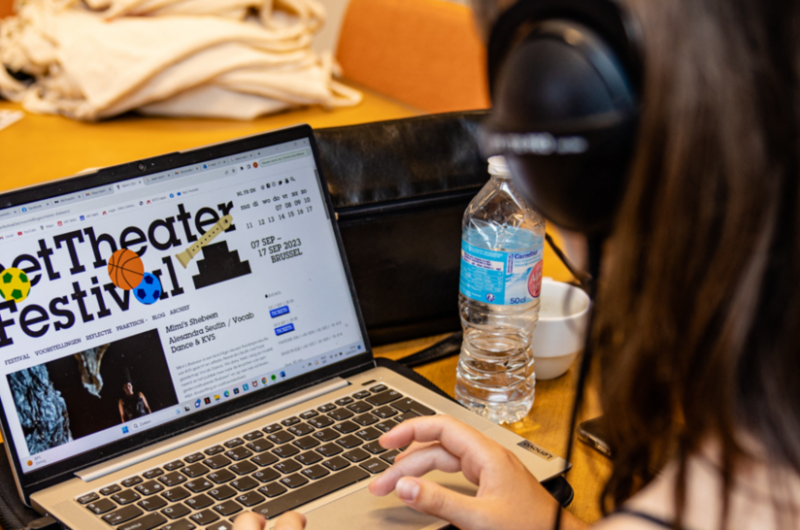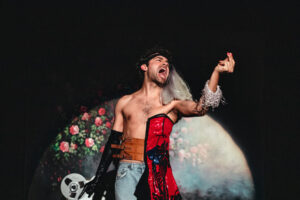
Stage: communicatie & sociale media
13 Maa 2024
zo 18 sep 2022
Mario Barrantes Espinoza, the Latin-American heart-throb, walked into the theatre with his black leather jacket and dangly pearl earrings. Quiet intelligence oozed from his pensive brown eyes as we sat in the upstairs green room of CAMPO for our interview. With a composed and introspective disposition, he shared his journey on his debut solo El cantar del playo or… a song is a rose is a thorn.
Hazel Lam

© Michiel Devijver
You decided on having a long title such as this and having both Spanish and English in it. What is the significance?
Mario Barrantes Espinoza: ‘It is important for me to reflect that this piece deals with language and vocabularies using my native tongue, Spanish, and my second language, English, which I had to learn during my studies as a dancer here in Belgium. I moved here knowing little English but studied in a school where English is the main language used. I struggled a lot in the beginning. I was not able to express myself emotionally or articulate what I needed from this institution, in classes and in daily life. I learnt through reading subtitles or Google Translate. Everything took longer and knowledge was mediated or filtered through someone else.
For the Spanish part of the title, I use a queer Costa Rican slang: Playo. The word itself corresponds to the idea of singing, poetry and music. The other part of the title responds to my interest in working with texts. For me, text is a tangible material and I took the liberty to appropriate Gertrude Stein’s poem “the rose is a rose is a rose” into “the song is a rose is a thorn”. It’s my personal statement that a lot of the knowledge I acquire from the West is either mediated or served as the priority for knowledge. So for me, it’s not that I am against Stein, but my appropriation is to make it into something that makes sense for what I have to do. I also want to go against the recent trend that titles of dance pieces are often very short or just one English word. I want something extra and dramatic as the title for this piece.’
This show premiered in April in Kunstencentrum VIERNULVIER this year. How’s the tour going so far?
‘I just came back from Costa Rica two weeks ago. It’s been quite hectic with rehearsals and shows in Antwerp. I need to switch back to the life I have here in Europe. With this show, I won the Roel Vernier Prijs in 2020, but it only premiered in April this year because of the backlog of bookings in theatre due to Covid, so I only started working on it in October 2021. Wow, I realise I‘m only just starting! I hope that it’ll be a long run as this is the first time I go solo and up to this level of production with a big team.’
What is the difference between working solo and working with a team? Which one do you prefer?
‘I like to expand my artistic practice into different mediums, but I also work with people whose expertise are the ones I do not have. Working with Pablo who is an amazing sound artist and choreographer himself; Ryoya who’s amazing with the lights, as well as with Flavio and Inacio who helped me a lot. Working with a big team is a huge learning process, because I also need to deal with myself as a director and performer of this piece. The choreography happened on stage but also in the organisation of the project. In the end, even though it’s stressful, I enjoy collaborating because dance for me is not enough at this point – I want to see how dance interacts with other fields.’
The show is a personal quest for queer sexuality and identity, from the perspective of a Central American migrant in Europe. What exactly is that perspective?
‘My experience in this part of Europe is that when people talk about Latin America, they talk about the South, for example Argentina, or Mexico in the North. People are less informed about Central Americans in art curation. There are many artists from this region, but there are many challenges such as financial possibilities and mobility, it is rare to see them here. After being here for so long, I want to see more of this context with the aesthetics and the realities that reflect what I am doing. Coming to Europe and joining institutions with students bearing colonial ideas of “I am coming to Europe to learn their knowledge” makes me aware of the knowledge that I already have inscribed in my body and my memory. It was suddenly undervalued and had to be erased to make space for this “good” knowledge. I have been in a constant state of resistance.
During these three years of school, I was behind because it is impossible to learn the whole western art, philosophy and sociology canon in these three years. My position there was to bring value to these things that were undervalued and show that these things are knowledge where I come from. Not academic knowledge, but knowledge from my body, my family, the music, the nature and the emotionality that I have experienced for so long before I came here. And most importantly, to contrast them to the aesthetics of making work here in Belgium. Studying here helps me to learn the vocabulary that they all want here and that’s also why I am able to perform this piece. I’ve learnt to say what they want to hear. My position now is to create a space where my type of knowledge can also exist, not that I want a representation of Central America, but hopefully this is to show one of the many experiences of Central Americans moving to Europe. I hope that more doors can be opened in the future so more people can have the chances I am having now.’
If you have to choose, which one of the Plancha songs you use in the show is your favourite?
‘My position on Plancha has changed and is not the same as it was ten years ago. The lyrics are about eternal possessive love, overly sentimental, exaggeration of emotions spilling out of your heart… which, at a specific time, has a specific function, and I still indulge in them. One of them is Juan Gabriel’s song Hasta que te conoci, which is the opening song of my piece. My interpretation is that he is singing to love or a lover, that “I knew about happiness and tenderness, but I didn’t know about this incredible pain to love you, because now I am thinking about you, and it’s extremely painful to think about you, because I cannot have you. And on the contrary if I have you then it’s not what I thought.” Just get over it, girl! (laughs) He never went to school to study music, but he’s an amazing singer and he writes songs for different artists in Latin America and in Spain.’
How was it when you told your family you wanted to come to Europe to study? Has your family seen this show?
‘It’s really sad that my mother hasn’t seen this show. Nobody in my family has seen me perform in Europe. In the beginning, they thought I was crazy to drop architecture to do theatre, and then move to dance. It was also the same year that I came out. My parents refused to pay for my studies in the arts so I went to the choir where I got a scholarship at the National University of Costa Rica. Later, I took all my savings and told my mum that I was going to audition in Europe. I got accepted into P.A.R.T.S.. My family realised that it was real and they became supportive of it.
The role of strong female figures is the central part of this piece because another aspect of it is to use melodrama, clichés and exaggerations to indulge myself in emotionality and cheesiness which was not welcomed in my training in P.A.R.T.S. Family matters and personal life are not considered good materials for creating “interesting” work for this institution. I feel that Europe, specifically Flanders where my work is presented, has this limit. Of course it’s political to talk about the family and the intimate. This Plancha music is connected to domestic work and reproductive labour which I learnt by heart when my mum or grandma were cooking and washing. So, as performance material, it expresses gender roles, the unpaid labour that has to be done and the social conditions that underlie these songs. In a sense, this is how I carry my mother, grandma, aunts and sister with me in this project. They travel with me.
The syndrome of the immigrant is that you have to excel in everything because there is no other way and this is your only chance. When I made this piece, I had to learn to let go of those traumas of not having a lot of access to things. Suddenly, I am making work in Europe in amazing conditions and there is this big challenge for me to not enhance this “otherness” in me and to exoticise my works. I am also constantly dealing with whitewashing. I am aware that this piece is going to be exoticised, but also, it’s not my responsibility. I’m not here to do the work that we should all be doing. It’s really tiring for me to come from Latin America to explain what Latin America is and what queerness is, and that access to human rights is not universal. We don’t all progress linearly towards the ideal future.’
What do you think about the gender neutrality of English?
‘Gender taste in English is way different, it’s flatter. (laughs) The challenge for this piece is to reflect what I wrote in Spanish using English, specially the gay slang where we treat each other as girls. Also, we are using slang from Costa Rica that is hard to translate. But I’m okay with the fact that we don’t have access to everything. This opens the possibility of having different understandings of the same thing and that there is no one dominant meaning.’
What about the future?
‘I want to work in spaces that are not theatres or an institution. I want to see if I can make an event that supports and promotes artists that fall into the intersection of queerness and Latin America. To make a night where the artists can have the space and create this social fabric for them to weave Latin American vibes into the city. We must have food in it, my family’s love language is food.’
